Public Holidays in the UAE: Significance and Insights
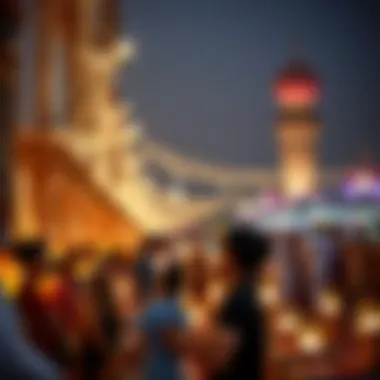
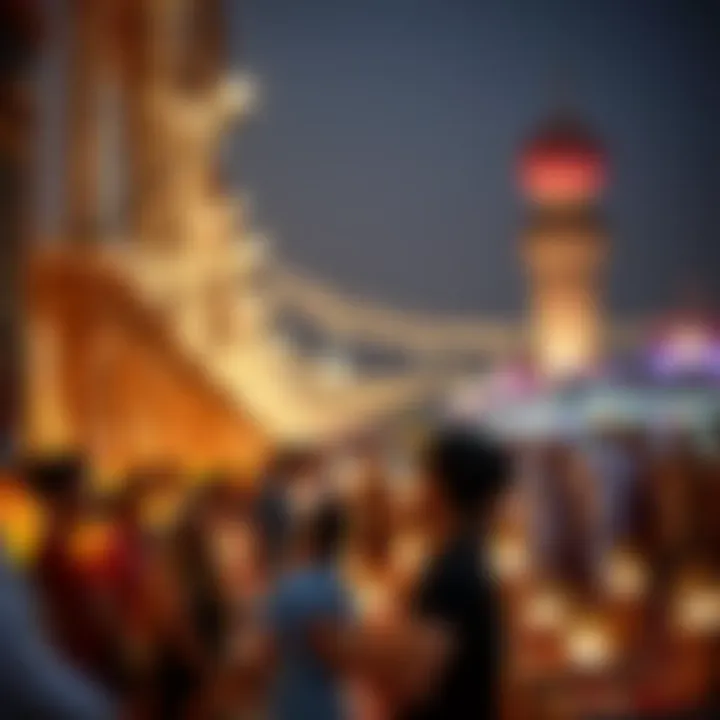
Intro
The United Arab Emirates, a nation that exists at the crossroads of modernity and tradition, offers a rich tapestry of public holidays that reflect its unique cultural heritage. Each holiday carries with it deep-rooted historical significance and societal implications for both Emirati citizens and expatriates alike. As global citizens flock to the UAE for work, leisure, and adventure, understanding the public holiday landscape is crucial for navigating the local culture and lifestyle.
Public holidays in the UAE vary significantly, encompassing both Islamic observances and national celebrations that are vital to the identity of this vibrant nation. From Eid al-Fitr marking the end of Ramadan to National Day celebrating the union of seven emirates, these days become focal points of community gatherings and festive activities. Residents and visitors alike can find themselves swept up in the exuberance of these occasions, which offer a preview of the UAE's ethos.
This article will explore the significance of these holidays, how they influence economic and social activities, and what they reveal about both traditional and contemporary values in the UAE. Additionally, we’ll discuss practical implications—like travel adjustments, business transactions, and lifestyle changes—during these important periods. By delving into the cultural roots and implications of these public holidays, we aim to illuminate the vibrant spirit that characterizes the United Arab Emirates.
Overview of Public Holidays in the UAE
Significance of Public Holidays
Public holidays in the UAE hold immense importance on various levels. They serve as designated times for citizens and residents to step away from their daily routines, come together as communities, and celebrate shared values and historical milestones. These breaks are not merely for leisure; they provide an opportunity for introspection and connection, reinforcing the social fabric of a nation that has seen rapid transformation.
A point worth noting is that these holidays often extend beyond just a day off. They foster a sense of national pride and identity, inviting both locals and expatriates to partake in the festivities. For instance, the celebration of National Day on December 2 not only commemorates the founding of the UAE but also invites every resident to immerse themselves in a shared sense of belonging. This is where you see fireworks light up the night sky, and parades showcasing Emirati heritage become a lively spectacle.
Moreover, public holidays often stimulate economic activities and can influence various sectors, from tourism to retail. The holiday period tends to see an uptick in travel and spending, creating opportunities for businesses to connect with both local consumers and visitors alike. This means that understanding the significance of these holidays can have substantial implications for market strategies and investments in the region.
Cultural Diversity and Its Influence
The UAE's public holidays reflect its celebrated cultural diversity. With a population that includes people from numerous countries, the holidays recognized in the UAE cater to various communities, fostering a sense of inclusivity. For example, while Islamic holidays take center stage, there are also acknowledgments of global celebrations such as New Year’s Day, reflecting the fusion of cultures.
This cultural melange influences how holidays are celebrated. Take Eid al-Fitr, for instance, a holiday marking the end of Ramadan. It's characterized not only by communal prayers and feasts but also by family gatherings that often include dishes from different cuisines, showcasing the collective culinary wealth brought by various nationalities.
In essence, public holidays in the UAE are more than just calendar entries. They present a chance for cultural exchange, allowing different communities to learn from one another. Whether it’s the sight of diverse flags on National Day or enjoying common festivals like Diwali among expatriates, the interplay of cultures enriches the overall experience of life in the UAE.
Ultimately, grasping the full picture of public holidays offers valuable insights into both the history and the contemporary lifestyle in the UAE. It can also pave the way for more harmonious coexistence, inviting everyone to respect and celebrate the rich tapestry that makes up this nation.
Key Public Holidays
New Year's Day
New Year's Day, celebrated on January 1st, marks the beginning of the Gregorian calendar year. While not traditionally significant in a predominantly Islamic country, it has nonetheless found a niche in the UAE, largely due to its cosmopolitan nature. People from all walks of life, including tourists and expatriates, gather in urban centers like Dubai and Abu Dhabi to attend fireworks displays and public festivities. Businesses often have special promotions or events, making this holiday an excellent opportunity for socializing and community engagement.
Eid al-Fitr
Eid al-Fitr is one of the most profound religious observances for Muslims, celebrating the end of Ramadan, a month of fasting and reflection. The date varies each year based on the lunar calendar, but it invariably brings families together. The day starts with a special prayer at mosques and is often followed by communal meals and gatherings.
The spirit of giving is central to Eid al-Fitr. It is customary to give Zakat al-Fitr, a form of charity that helps those in need. This emphasis on generosity reflects the UAE's cultural core, where hospitality and kindness are foundational values. For expatriates, embracing this holiday means understanding its significance and participating in local customs, which aids in fostering better relationships with their Emirati counterparts.
Eid al-Adha
Known as the "Festival of Sacrifice," Eid al-Adha commemorates the willingness of Ibrahim (Abraham) to sacrifice his son as an act of obedience to God. This holiday occurs on the 10th day of Dhu al-Hijjah, the last month of the Islamic lunar calendar, coinciding with the annual Hajj pilgrimage in Mecca. Families honor this day by sacrificing livestock, with a part of the meat distributed to the less fortunate.
Festivities include prayers, family gatherings, and feasting. In the UAE, it's common to see communities engage in various events, ranging from traditional performances to exhibitions centered around cultural heritage. For expatriates, this holiday is an opportunity to learn more about Islamic traditions and engage in cross-cultural exchanges.
Commemoration Day
Formerly known as Martyrs' Day, Commemoration Day is held on November 30 each year to honor the sacrifices made by the UAE's soldiers in the line of duty. This day is marked by solemn reflection and gratitude toward those who have served the nation.
Ceremonies take place across the country, with many attending events that include parades and speeches. The government encourages citizens and residents alike to observe a moment of silence, showcasing the unity and respect the nation has for its heroes. Understanding the significance of Commemoration Day gives expatriates insight into the values of loyalty and sacrifice that permeate UAE society.


National Day
National Day, celebrated on December 2nd, marks the formation of the United Arab Emirates in 1971. This holiday is a vibrant expression of Emirati pride, with festivities that include parades, fireworks, and cultural performances. People decorate their homes, cars, and streets with flags, highlighting the unifying spirit of the day.
The National Day is not just a celebration of history but a day to reflect on progress and aspirations for the future. For those living in the UAE, participating in this celebration fosters a sense of belonging. Businesses often engage in various activities, from special promotions to community outreach, benefiting both locals and expatriates alike.
Historical Context of Holidays
Understanding the historical context of holidays in the UAE is pivotal for grasping the ways in which these occasions shape social cohesion and national identity among its citizens and residents. Throughout the years, the UAE has adhered to traditions draped in rich historical significance. The blend of Islamic values with the groundbreaking changes brought about by modernization underpins the observance of various public holidays. Recognizing the roots of these holidays illustrates how intertwined cultural narratives and historical milestones are, while also shedding light on their significance in present-day society.
Origins of Islamic Holidays
Islamic holidays have roots deeply embedded within the faith itself, marked by pivotal events in the Islamic calendar. One of the most notable origins can be traced back to the time of the Prophet Muhammad. For instance, Eid al-Fitr signifies the end of Ramadan, a month dedicated to fasting and reflection. The holiday welcomes a time of feasting and communal prayers; it not only symbolizes breaking the fast but also emphasizes charity paying, known locally as Zakat al-Fitr.
In contrast, Eid al-Adha is commemorated during the Hajj pilgrimage, linking back to the faithful story of Ibrahim's willingness to sacrifice his son as an ultimate act of devotion. Both Eids carry significant resonance in nurturing community ties and enhancing the spiritual landscape of the UAE.
Evolution of National Celebrations
As the UAE emerged from a cluster of independent coastal sheikhdoms into a unified nation in 1971, its national celebrations devised a unique identity that evolved alongside the country's rapid economic transformation. National Day, celebrated on December 2, marks not only the independence of the UAE but also fosters a heightened sense of national pride. Initially, the celebration was somewhat subdued; however, over the decades it has morphed into a vibrant display of fireworks, parades, and cultural exhibitions that galvanize both Emirati citizens and expatriates alike.
The commemoration of this day serves as a reminder of the sacrifices made during the formation of the nation while embracing a forward-thinking mindset. The fusion of traditional cultural elements with contemporary festivities creates a cohesive societal fabric where historical consciousness is respected but not chained to the past.
In essence, public holidays in the UAE serve as a reflection of the nation’s diverse narrative, underscoring a duality of holding fast to time-honored traditions and adapting to the present for a brighter future.
"Holidays connect us to our past and ground us in our present, through traditions that reflect a rich tapestry of history and cultural amalgamation."
Further reading on the historical context and significance can be found at Britannica and Wikipedia.
Regional Variations in Celebrations
The UAE is made up of seven emirates: Abu Dhabi, Dubai, Sharjah, Ajman, Umm Al-Quwain, Fujairah, and Ras Al Khaimah. Each emirate has its own local flavor and customs, creating a mosaic of celebrations that reflect the distinct identities of the regions.
Moreover, these celebrations are significant not only from a cultural standpoint but also from a business perspective. Knowledge of when these holidays occur and how they're observed helps organizations to plan their operational schedules and marketing strategies effectively.
Emirate-Specific Traditions
In Abu Dhabi, the capital, public holidays often revolve around national pride and heritage. Events such as National Day are marked by parades and fireworks that exude a sense of unity. Meanwhile, Dubai, known for its modern architecture and international flair, showcases public holidays with grand festivities. The Dubai Shopping Festival coincides with New Year's celebrations, attracting visitors and boosting tourism. This blending of commerce and celebration reflects Dubai's dynamic economic landscape.
Sharjah stands out for embracing its artistic roots during public holidays. Various cultural exhibitions and traditional performances take place, promoting local artisans and reinforcing the emirate’s dedication to preserving heritage.
- Abu Dhabi: Celebrations showcase national pride with parades.
- Dubai: Grand festivities and shopping deals attract tourists.
- Sharjah: Cultural exhibitions highlight local traditions.
Local Customs and Practices
Beyond the official public holidays, local customs significantly enhance the holiday experience across the UAE. In many emirates, the gathering of families and friends is an essential aspect of celebrations. For instance, during Eid, it’s common for families to prepare and share traditional meals, such as majboos in Ajman or harees in Dubai. Such practices underscore hospitality and community bonding.
Furthermore, cultural events often accompany public holidays, with many communities organizing bazaars, traditional crafts stalls, and performances that draw in crowds. These activities not only preserve local heritage but also foster a sense of belonging among residents, expatriates, and tourists.
"Public holidays in the UAE serve as a reminder of the nation's rich cultural heritage and the importance of community spirit."
Impact on Business and Economy
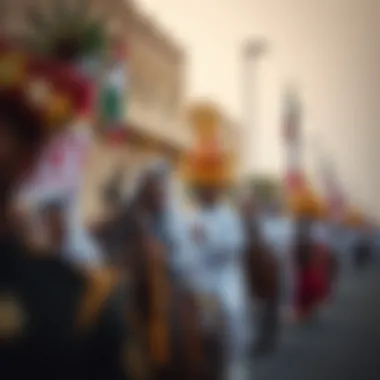
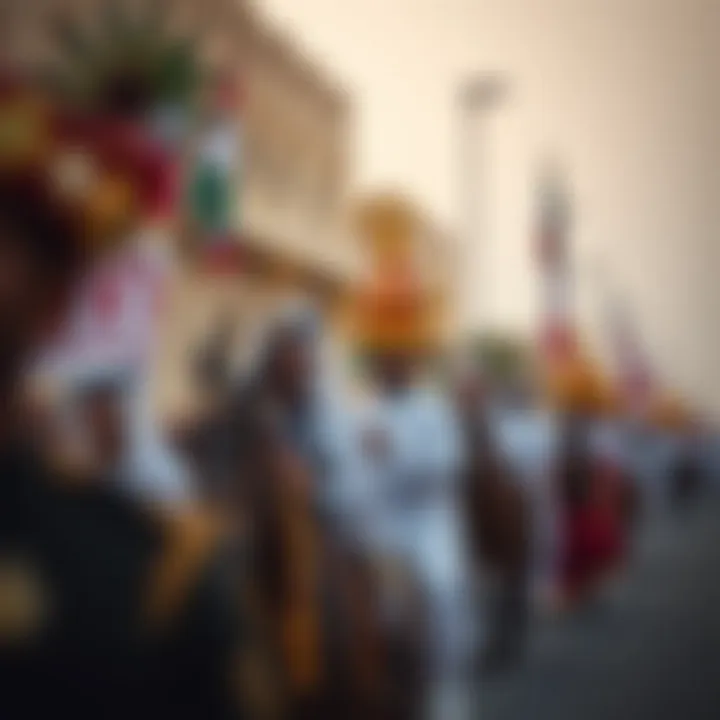
The role of public holidays in the UAE extends far beyond mere time off from work; they carry significant implications for the nation's business landscape and overall economy. Understanding these dimensions is critical for investors, expatriates, and analysts alike. Public holidays can act as double-edged swords, presenting both opportunities and challenges in various sectors. As such, their impact on the economy warrants thorough examination.
Business Closures and Adjustments
During public holidays, business closures are not only common but often mandated. The UAE observes several holidays where both public and private sectors may halt operations.
- Standard Holiday Patterns: Many businesses, especially in retail and services, adopt uniform closure practices during holidays like Eid al-Fitr and National Day. Companies often adjust their operational hours to cater to this cultural shift, creating unique challenges for sectors reliant on consistent customer traffic.
- Festive Hours: On the flip side, some enterprises, such as hospitality and entertainment venues, ramp up their services in anticipation of increased patronage. Hotels and resorts often offer special packages to attract tourists and families celebrating the holidays.
This push and pull creates a dynamic atmosphere. Importantly, businesses may also face setbacks due to workforce availability. Employees may take leave to celebrate with families, leading to potential staffing shortages during these peak times. This fluctuation can hinder productivity and constrain operations if not managed carefully.
Influence on Tourism
Public holidays in the UAE are a magnet for tourists, often drawing expatriates and international visitors who seek to experience these unique cultural festivities. The influx of tourists during holidays increasingly becomes a crucial element in bolstering the economy.
- Spike in Travel Demand: Holidays, particularly those like Eid and New Year’s Day, witness a surge in travel bookings. Airlines and hotels benefit immensely from this seasonal uptick. For instance, Emirates Airlines often sees fully booked flights during these times, capitalizing on the spirit of celebration.
- Cultural Exchange Opportunities: Tourists arriving in the UAE for holidays have the chance to engage in local customs, sample traditional cuisine, and partake in community events. These elements of cultural exchanges yield not just memorable experiences for visitors, but also amplify local businesses — from food vendors to artisan markets.
Insights into the Economic Ripple Effects
The benefits of public holidays on tourism reverberate throughout the economy. Increased footfall in shops and historical sites translates to job creation, enhanced revenue for local businesses, and can drive further investment in tourism infrastructure. Consequently, the economic landscape adapts, evolving alongside cultural trends that influence consumer behavior.
“Public holidays are not just significant for cultural reasons; they also serve as valuable economic levers that shape business strategies in the UAE.”
As local and global trends intertwine with the country’s celebrations, the UAE stands as an exemplar of how culture can coexist harmoniously with economic growth. By distinguishing the nuances of holidays, one gains insight into the broader implications for businesses navigating these vibrant periods.
Relevant Resources
For further insights into the economic impacts of public holidays, consider visiting:
Public Holidays and Social Engagement
Community Events and Activities
Throughout the UAE, public holidays are marked with a variety of community events and activities that bring people together. Take Eid al-Fitr, for instance; this festival, which marks the end of Ramadan, sees families hosting lavish feasts and sharing meals with neighbors. It's not just a time of personal reflection but also communal joy, with large public gatherings held in parks and mosques where people can come together to celebrate.
Furthermore, National Day ceremonies are often grand affairs, featuring parades, fireworks, and even cultural performances showcasing traditional music and dance. Such events not only allow locals to express their pride but also invite expatriates to learn about and appreciate Emirati heritage. Participating in these celebrations offers expatriates an opportunity to connect with new friends and neighbors, fostering a sense of community.
- Local Markets: During public holidays, markets spring to life with colorful decorations and food stalls that showcase both traditional and contemporary flavors.
- Workshops and Activities: Many cities also organize workshops related to Emirati crafts, art, and cooking, which promote cultural exchange and engagement.
The Role of Cultural Celebrations
Cultural celebrations during public holidays serve as a mirror reflecting the rich heritage of the UAE. Events such as Commemoration Day and National Day encourage individuals to engage with their culture while sharing it with others. You could argue that these holidays act as cultural platforms where expatriates can immerse themselves in local customs, enhancing mutual respect and understanding.
The vibrancy of the festivities reflects the UAE's philosophy of tolerance and coexistence. For example, during Eid al-Adha, regardless of one's background, participating in communal prayers and sharing meals is encouraged. It’s also common to see families coming together for volunteer initiatives, showcasing the spirit of giving that’s central to many Emirati traditions.
Moreover, these celebrations often spark conversations about the country’s history and future, encouraging both locals and visitors to engage in meaningful discussions about identity and belonging. On a broader scale, public holidays in this region enhance social cohesion, allowing people of different backgrounds to unite under a shared experience.
Overall, public holidays in the UAE are not merely days off from work; they are vibrant opportunities for social engagement that cultivate community spirit and cultural exchange.
Public Holidays for Expatriates
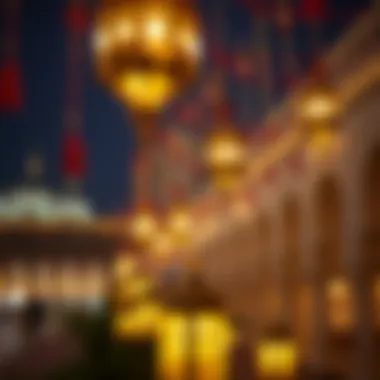
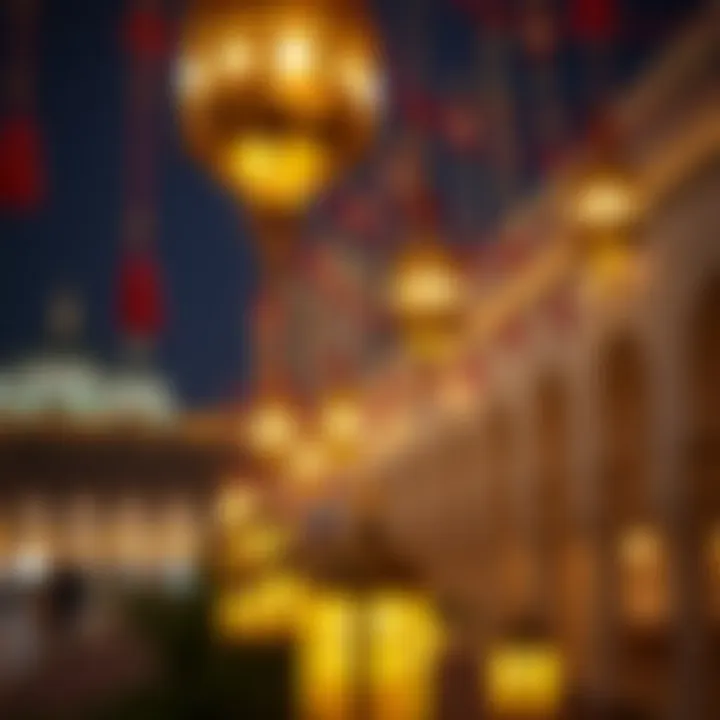
Living in the United Arab Emirates as an expatriate offers a rich tapestry of cultural experiences, especially during public holidays. Understanding these holidays is not just about knowing when the days off are; it’s about being integrated into the social fabric of the UAE. Expatriates play an essential role in the economy and culture here, and public holidays reflect a blend of local tradition and the diverse backgrounds of international residents.
Understanding Local Holidays
Public holidays in the UAE can be classified primarily into two categories: Islamic holidays and secular national celebrations.
- Islamic Holidays: These revolve around the lunar calendar, which means that the dates vary each year based on moon sightings. Eid al-Fitr and Eid al-Adha are the primary Islamic holidays that expatriates often observe, even if they don't practice Islam. The communal prayers, festive meals, and sharing of gifts resonate with all residents. Understanding the significance behind these days fosters a sense of belonging.
- Secular Holidays: Days like National Day and Commemoration Day reflect the UAE's history and achievements. For expats, participating in these celebrations—whether through watching parades, enjoying fireworks, or attending public events—can offer a unique insight into the national identity.
On any given holiday, you might find expatriates joining their Emirati friends in enjoying traditional cuisines or participating in local events. It’s a delightful way to blend in and fully embrace the vibrant culture here.
Navigating Cultural Sensitivity
Cultural sensitivity is crucial for expatriates during public holidays, especially given the celebration's diverse nature. Here are some key points to remember:
- Respect Religious Practices: Understanding that public holidays like Eid are rooted in deep religious significance is vital. Joining prayers or festivities if invited can show respect, but always ask permission first.
- Participate Mindfully: Expatriates can participate in events and celebrations to foster inclusiveness. For instance, if invited to an Iftar meal during Ramadan, it’s essential to be respectful and understand the practices surrounding fasting.
- Enjoy Diverse Events: The UAE’s multicultural environment means that various cultural events are also celebrated. From Diwali to Christmas, expatriates are encouraged to join in these diverse holiday festivities, reinforcing mutual respect and understanding.
- Gift-Giving Etiquette: While giving gifts is common in many holidays, it’s important to know what is appropriate. For Eid, for example, it’s customary to give sweets or small tokens. Visiting friends during festivities while bearing a gesture of goodwill, such as snacks or drinks, can go a long way in strengthening relationships.
Observing and respecting these nuances of local holidays can enrich the expatriate experience tremendously. By taking the time to learn about and engage with the customs surrounding public holidays, expatriates not only honor the traditions of their host country but also find a pathway to deeper connections with their Emirati counterparts and fellow expatriates.
"Cultural understanding is the bridge between diverse people, and public holidays offer a unique chance to build these connections."
Ultimately, public holidays in the UAE can serve as an antidote to isolation, allowing expatriates to feel part of a community that celebrates its heritage while embracing their own cultures.
Future of Public Holidays in the UAE
Public holidays in the UAE have long been seen as markers of the nation’s cultural identity and pride. Looking ahead, it’s crucial to consider how these holidays may evolve in the patchwork of a globalized society. The discussion about the future of public holidays not only signals a shift in identity but also reflects the adaptability of a nation that cherishes its traditions while embracing modernity.
Potential Changes and Trends
As the UAE often finds itself at the crossroads of tradition and innovation, future public holidays may undergo significant transformations. One noteworthy trend could be the possible inclusion of global observances. For instance, with the increasing influence of Western holidays, there’s a chance that days like Thanksgiving or even Earth Day might find their way into the local calendar. The rationale behind such changes might be to create a more inclusive atmosphere for residents and expatriates alike. After all, this nation is home to a melting pot of cultures, each with unique celebrations.
Moreover, the UAE government consistently shows a willingness to adapt. A trend observed in recent years includes the shifting dates for Islamic holidays based on lunar sightings, creating a more fluid holiday calendar which resonates with the community’s cultural practices. There’s a possibility that this flexibility may extend to other public holidays as well, giving room for celebrations that align with the societal and economic rhythms of the country.
However, it’s essential to balance tradition with change. As one local business owner mentioned, “A holiday without our roots is like a tree without its trunk.” The UAE’s commitment to retaining its heritage suggests that while innovations may arise, foundations will stay deeply rooted in the nation’s essence.
Influence of Globalization
Globalization has become a double-edged sword for many traditions around the world. On one hand, it provides opportunities for cultural exchange and enrichment; on the other, it poses challenges to maintaining unique identities. In the context of UAE public holidays, globalization fosters a blend of cultural practices that may influence how these holidays are celebrated.
For expatriates, the infusion of their own cultural holidays into the fabric of UAE’s public festivities can create a richer, more vibrant community experience. For example, Diwali celebrations have gained traction within the UAE, with lavish events drawing in crowds of various backgrounds. Likewise, with a growing interest in international holidays among local Emiratis, there may be a gradual blending of customs that reflects a shared global heritage.
This influence can also be seen in how businesses adapt during public holidays, accommodating the needs of diverse populations. Retail and tourism sectors may innovate offerings during these holidays to attract broader audiences.
Ultimately, as these global influences continue to shape the future of public holidays, the UAE will face the challenge of curating a calendar that respects its Islamic heritage while welcoming cultural diversity. In this delicate interplay, how the nation chooses to navigate its identity will define the atmosphere and essence of public holidays for years to come.
For more information on the topic, you can explore resources such as Wikipedia and Britannica.
The End
Summary of Findings
Throughout this article, we’ve dissected the significance of various public holidays, highlighting events like New Year’s Day, Eid al-Fitr, Eid al-Adha, Commemoration Day, and National Day. Each of these celebrations carries its own unique narrative—whether they stem from Islamic practices or are steeped in the nation’s history. By observing these holidays, individuals not only honor their heritage but also engage with the evolving identity of the UAE.
Moreover, the festivities foster a spirit of generosity and hospitality, bringing communities together while also enabling a richer experience for expatriates who seek to understand and integrate within the local culture.
Final Thoughts on Cultural Integration
In a melting pot like the UAE, public holidays act as cultural touchstones that help bridge the gap between diverse backgrounds. They encourage dialogue, participation, and mutual respect among people from varying lifestyles. This cultural integration goes beyond simply observing traditions; it often leads to collaborative festivities where locals and expatriates alike come together to celebrate and appreciate one another's customs.
Without a doubt, as the UAE continues to position itself on the global stage, the way public holidays are observed and celebrated will likely adapt. Economic growth, coupled with increasing global influences, means that public holidays might evolve. However, the underlying significance they hold for personal and communal identities will always remain paramount. Through these celebrations, the spirit of the UAE’s unity and diversity thrives, creating a rich tapestry of experiences that resonate beyond cultural boundaries.



